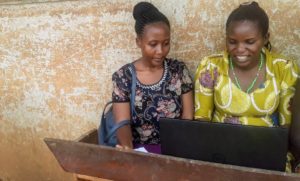
Information and communication technology (ICT) plays an increasingly important role in economic development, especially for developing countries that have the opportunity to leapfrog over the inefficient or environmentally harmful systems and practices that already-developed countries could or did not avoid.
Whether it is improving the delivery of public and private goods and services, connecting people to regional or even global markets, or increasing the ease at which information is accessible, ICT mas a major role to play in whether, and how fast, developing countries like Uganda will achieve their socio-economic, health, employment, and sustainable development objectives in the upcoming years.
Part of getting Uganda up-to-speed on ICT involves equipping it with the tools and infrastructure that it needs to thrive. Another part lies with equipping it with the skills to properly use these tools and infrastructure for its own betterment.
In Uganda, not only are the tools often not readily available, but neither are the skills. While mobile phones have reached 19.5 million people, or a little over half of the population (52.3%), for example, penetration of other tools like computers has barely scratched the surface, with just 3.8% of Ugandans owning a computer. If the nation is to systematically tackle this knowledge and resource deficit to accelerate its path toward modernization and ICT uptake, a logical place to start might be with the youngest citizens in the education system.
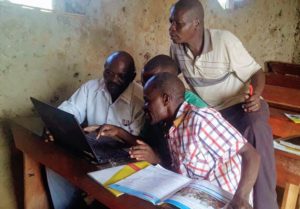
Teachers at the New Eden Primary School in Kamwenge District practice writing their CVs together.
However, while a national ICT policy was adopted in 2003, an education sector ICT policy is still not in place. And although the Ministry of Education and Sports is taking steps to coordinate one, in the meantime, there is an unmet need for integrating ICT in the classroom and helping the youngest generations and especially teachers to access business and employment opportunities, information, and markets.
Building Tomorrow Fellows Namata Tendo and Lucky Natukunda from our third cohort are taking a proactive approach to filling such knowledge and resource gaps through several modest, but growing, initiatives in their communities.
One of these initiatives is called “5P: ICT Teachers Changemakers.” The 5 “P’s” are Proper Preparation to Prevent Poor Performance, and the initiative focuses on motivating and equipping teachers with technology skills that not only help them in the classroom, but can advance them professionally and personally as well. The goal is to introduce teachers to fundamental computing concepts, software, and skills that can improve their lives both inside and outside of the classroom.
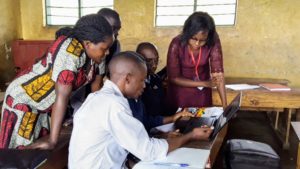
During the computer classes, groups of 4-5 teachers share a laptop and practice their skills together.
“We drew a curriculum,” Namata explains. “We don’t just come and wing it. They know what they are going to study in advance.” Topics include everything from elementary skills like how to open files on a computer to data entry in Excel and even navigating Microsoft Word. Through learning these fundamental skills and software, teachers learn how to do things like write a document, cover letter, and CV, as well as create tables to organize information. Some of these skills, particularly related to data entry with Excel, will come in handy at the administrative level in schools following the primary leaving examination (PLE)—the first major national exam for which students must sit. “Excel, actually, will help us to fill in some data. Data entry is big now,” says Namata.
Namata and Lucky now run the initiative at 6 of the 8 government schools at which they work and are hoping to expand it to all 20 schools with which the Fellows in their geographic cluster operate. Namata herself works with a total of 17 teachers at the Kyehemba Primary School and New Eden Primary School in Kamwenge District.
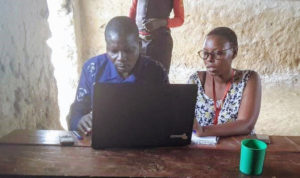
Fellow Namata Tendo sits with second grade (P2) teacher Patrick Byaruhanga at New Eden Primary School as he demonstrates what he has learned. Patrick has never had a chance to use a computer and is excited about being able to touch one for a year through the ICT classes. He hopes the classes will help him to record his information at his farm and provide a creative way for both teachers and students to admire his class.
But what is perhaps more inspiring are the lengths to which the Fellows go to put on these workshops for the teachers, despite all of the obstacles they are up against. The Fellows, for example, are working with just their own two computers lent to them by Building Tomorrow as part of the Fellows Program and both live and work in communities without access to electricity.
“Electricity is our biggest challenge,” explains Namata. “Because even ourselves as Fellows, we do not have it. So for charging, we have to find a plug.” But the girls are clear that it is a hurdle and not a roadblock, and their enthusiasm alone is electric. “Power is a big challenge, but it can’t make us not do the work,” says Namata.
Far from giving up, the girls are, in fact, expanding their ICT enterprise. Recently, the girls launched another initiative incorporating computers called Embibo. Embibo, meaning “seed” in the local Rukiga language, aims to offer hope and opportunities for young mothers at New Eden Primary School. Some of the mothers are as young as 15 years old, and similar to those involved with the “5 P’s” initiative, are in need of ICT skills alongside the leadership, management, organization, and communication skills taught through Embibo. In the words, whereas “5 P’s” focuses on teachers, Embibo centers on young mothers, putting the “mother” in “motherboads.”
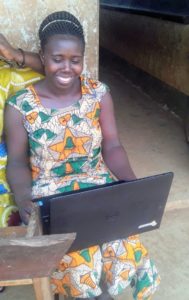
The ICT skills learned in class can be used both professionally and personally. Anne Tumwebaze, a first grade (P1) teacher at Mahani Primary School, loves to sing and hopes to use Facebook to promote her songs in the future.
Explaining the vision behind the initiative, Namata says that some of the young mothers feel that after they have given birth, their lives are over. “I’m looking at how we can assure them that there is still a way that life can go on after birth. And they can empower their children, even if they did not actually complete their courses,” explains Namata.
Similar to “5 P’s,” Embibo works with computers but instead of Namata and Lucky leading the classes, it is the teachers themselves interacting with the mothers in their own language, cascading the skills to other people. Such lessons take place twice a week on Thursday and Friday afternoons and aim to connect the young mothers not just to skills, but to improved opportunities.
The initiative, which also aims to empower women through financial skills and rights education while serving as a force against gender-based violence, recently received recognition and a £500 pound grant from Akina Mama wa Afrika, an international non-governmental organization focused on strengthening African women’s leadership.
Through both “5 P’s” and Embibo, the Fellows are challenging the idea that rural communities have to wait for technological education and are pushing the boundaries of what ICT education can look like in underserved areas. And, it’s clear from the testimonies of the teachers and mothers, that their lessons are finally “clicking.”
Building Tomorrow congratulates Fellows Namata Tendo and Lucky Natukunda for their creative ingenuity and relentless determination to bring technological skills to the rural communities in which they work. To read more about our Fellows Program and its changemakers working in hard-to-reach communities across rural Uganda, click here.

Follow Us on Social Media